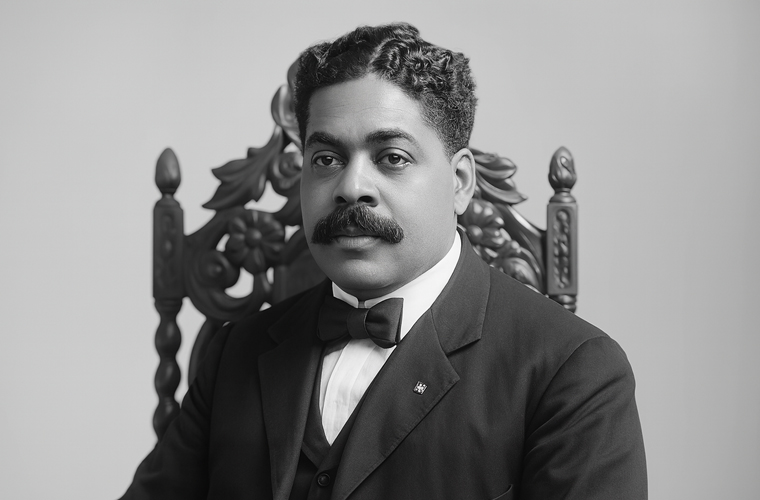Arturo Alfonso Schomburg, born on January 24, 1874, in Santurce, Puerto Rico, emerged as a pivotal figure in the study and preservation of African diaspora history, dedicating his life to illuminating the contributions of people of African descent. His journey was shaped by a deep curiosity about his African ancestry, sparked in the multicultural setting of Puerto Rico, where diverse cultural influences fueled his passion for knowledge. This early exposure to a vibrant, multifaceted society set the stage for a lifelong commitment to uncovering and celebrating the often-overlooked achievements of African peoples.
In 1891, at the age of 17, Schomburg immigrated to New York City, driven by a desire for greater educational opportunities and a platform to pursue his historical interests. Settling in Harlem, he immersed himself in the intellectual life of the city, enrolling in night classes at Cooper Union and frequenting the New York Public Library. These institutions provided him access to vast repositories of literature, history, and art, which he eagerly explored. His studies were not limited to formal education; Schomburg was a voracious self-learner, driven by an insatiable curiosity about the global African experience.
Schomburg’s dedication to historical inquiry led him to amass an extraordinary personal collection of over 10,000 items, including rare books, manuscripts, artworks, and artifacts that chronicled the achievements of African and African-descended peoples. His collecting was methodical and purposeful, aimed at preserving evidence of African contributions to world civilization that were often ignored or erased by mainstream historical narratives. He sought out materials from across the African diaspora, from ancient African kingdoms to the cultural and intellectual contributions of African Americans, Caribbean, and Latin American communities. This vast archive became a cornerstone of his legacy, reflecting his belief that history was a powerful tool for reclaiming identity and challenging systemic erasure.
In 1911, Schomburg co-founded the Negro Society for Historical Research, an organization dedicated to advancing the study and preservation of African history and culture. Through this platform, he collaborated with other scholars and activists to promote research that highlighted the richness of African civilizations and their global impact. His essays and articles, published through the society and other outlets, challenged Eurocentric historical perspectives that marginalized African contributions. Schomburg’s work emphasized the sophistication of African societies, their advancements in art, science, and governance, and their influence on the Americas and beyond. His scholarship was groundbreaking, providing a foundation for future generations of historians and activists to build upon.
Schomburg’s efforts extended beyond academic circles, influencing broader societal perceptions of African heritage. He was a key figure in the Harlem Renaissance, a cultural movement that celebrated Black artistry and intellectualism. His collection and ideas inspired contemporaries like Langston Hughes and Zora Neale Hurston, who drew on his resources to enrich their own work. Schomburg’s commitment to historical truth was also a form of activism, as he sought to empower Black communities by providing them with a documented legacy of resilience and achievement.
In 1926, Schomburg’s collection was acquired by the New York Public Library with the support of the Carnegie Corporation, forming the nucleus of what would become the Schomburg Center for Research in Black Culture. Located in Harlem, the center has grown into one of the world’s leading institutions for the study of African and African diaspora history. It houses an extensive archive, including manuscripts, photographs, rare books, and oral histories, and serves as a vital resource for scholars, students, and community members. The center also hosts exhibitions, lectures, and cultural events that continue to amplify marginalized voices and celebrate the diversity of Black experiences.
Schomburg’s influence endures through the ongoing work of the center, which remains a beacon for those seeking to explore the complexities of African history. His vision of a world where the contributions of African-descended peoples are fully recognized continues to inspire researchers and activists. The Schomburg Center not only preserves its collection but also embodies its mission to unearth hidden stories, challenge historical biases, and foster a deeper understanding of the African diaspora’s role in shaping global culture.
Throughout his life, Schomburg faced significant challenges, including racial discrimination and limited resources, yet his determination never wavered. His work was driven by a profound sense of purpose: to ensure that the stories of African peoples were not lost to history. By documenting their achievements and preserving their cultural artifacts, he laid the groundwork for a more inclusive historical narrative. His legacy is not only in the physical collection he left behind but also in the intellectual and cultural movement he helped ignite, one that continues to resonate in academic institutions, cultural organizations, and communities worldwide.
Arturo Alfonso Schomburg passed away in 1938, but his impact remains vibrant. The Schomburg Center for Research in Black Culture stands as a living testament to his vision, serving as a hub for education, research, and cultural celebration. It attracts scholars and visitors from around the globe, offering access to a wealth of materials that illuminate the African diaspora’s contributions to humanity. Schomburg’s life and work remind us of the power of knowledge to transform perspectives, uplift communities, and inspire change. Through his relentless pursuit of truth, he ensured that the voices of African peoples would be heard, their stories preserved, and their legacies honored for generations to come.

